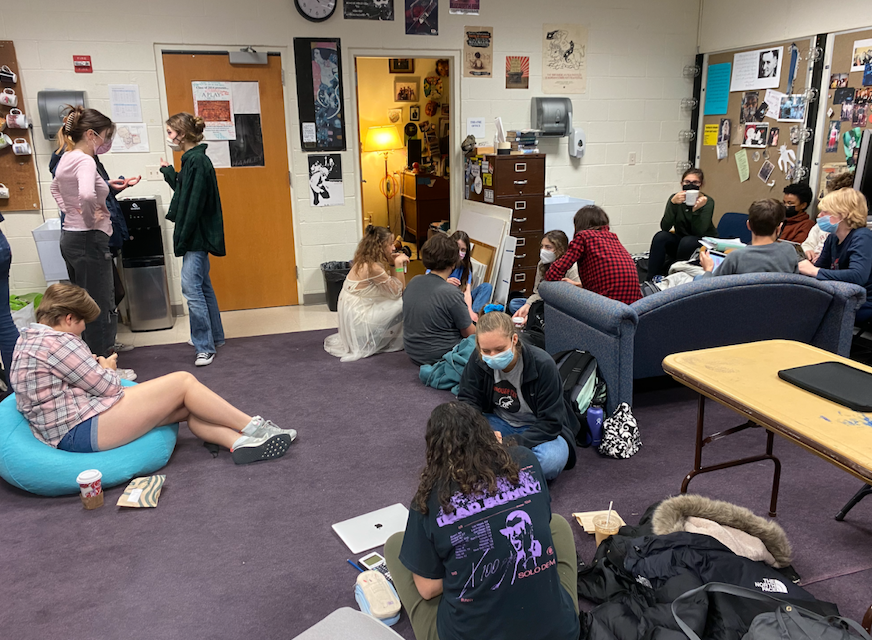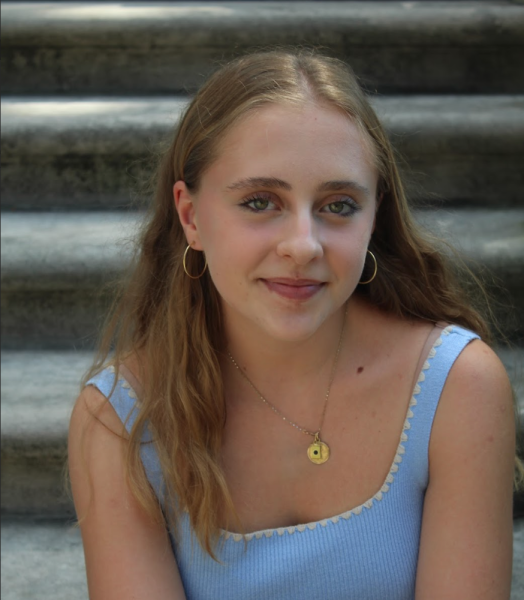Three doors down from the Larry Vincent Foyer is a cozy backstage room. There’s a bookcase spanning half of the right wall, a somewhat functioning teapot, couches, and a poster with Shakespeare’s plays’ death counts. The atmosphere is warm and quiet chatter fills the room.
Kerri Rambow, the IB Theater/Theater Arts teacher, enters and tells everyone to set up for the first rehearsal of the day, “Words, Words, Words.” It is one of the six short plays that make up the Upper School production. Students quickly convert The Black Box Theater into an experimental spot for monkeys, complete with a tire swing.
The play is a collection of short plays, whose plots are not related but are connected by general themes. Each of the plays has a separate storyline and is designed to make the audience laugh. Some are based on real events, while others are completely fictional.
Rambow’s productions rely on collaboration with her co-director, scenic designer, and husband, Ian LeValley. LeValley can be found working at a large table in the center of the shop with different-sized sections of wood. The shop is where he creates many of the pieces for the set.
They explain this isn’t the first time they’ve seen or taught the six short plays.“We’ve known about these plays since we were in conservatory,” Rambow begins. “So we’ve known about them for a very long time.”
LeValley adds that they were common in the 1990s. Conservatories commonly used the plays because students can perform the entire play in the span of fifteen minutes. Rambow and LeValley saw a performance of these plays in a comedy class once.
Tonight is the opening night for the Upper School Play, “All In The Timing,” written by David Ives. It will take place from Thursday, Dec. 9 to Saturday, Dec. 11 from 7 p.m. to 9 p.m. Although the actors will remove their masks, the audience is required to wear their masks and, for those above the age of 12, proof of vaccination is also required.
For COVID-safety, the production will be split up into different places on campus. “What made sense this time around was… to split up the plays in different places so that the audience is small and the cast’s in a cohort,” LeValley explains.
This would allow for more distancing while an equal number of people as before the pandemic can see the show. There will be 15 people per group and only three actors in each short play.
The audience will be separated into groups using color-coded programs.“[They’ll] be seeing different rotations,” Rambow said. “Everybody gets to see everything but it’s 15 people at a time seeing one play, so all the kids have to perform six times a night.”
The actors are excited about opening night. There’s a strong community feel within the cast, even though they’re all in different plays.
Spanning six separate, short plays and six different places, the play is nothing like what the theatre department has done in the past.
“I think it’s really fascinating,” senior Olivia Connolly said, who’s a stage manager for one of the plays. “I’ve never been a part of a show like this.”

The play will be dedicated to Larry Vincent, who passed away on Dec. 2, 2021. Vincent was a music teacher at WIS from 1973 to 2009, directing 64 productions in his time here, and he even lived in the attic, where there are now the finance and advancement offices in the mansion. “Larry was a force of nature,” Rambow said. “For the musicals, he did it all: played the piano, was [the] director, music director and [conductor]. He was a fiercely honest friend, had a wicked sense of humor and was a super creative music teacher.”
The actors formed a close-knit community during the time they spent rehearsing. They were at school until late preparing for the performance.
“One challenge was, when we stopped using masks, one of my castmates would look us in the eye and start laughing,” freshman Zora Brown said. “And so we would all get the giggles when we removed masks.”
This is many performers’ first time in an in-person Upper School play, and they agree it’s very different from middle school.
“[My favorite part is] the limitlessness of creativity you have,” sophomore Emilia Kudela said. “The amount of maturity and technicalities and exploration in high school is on a different level.”
By Isabella Duchovny


































































